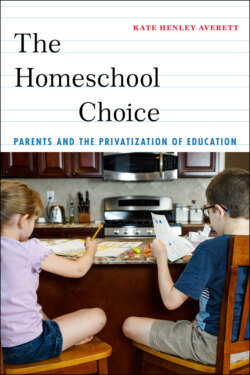Читать книгу The Homeschool Choice - Kate Henley Averett - Страница 11
На сайте Литреса книга снята с продажи.
Mothering and Gender Inequality
ОглавлениеCultural beliefs about childhood are intimately tied to beliefs about what it means to be a good parent, and more specifically, how to be a good mother. Parenting the “sacred child” requires the investment of money and time, particularly on the part of the mother, and it requires that parents take a protectionist stance toward their children, as the sacred child holds an emotional value greater than any other.17
The investment of time and money into raising children is the hallmark of what Sharon Hays dubbed the “ideology of intensive mothering,” which, she argued in the 1990s, had become the dominant way of thinking about parenting in the United States.18 Intensive mothering functions as an ideology insofar as it orients the behavior of mothers in certain ways.19 Though this ideology is adapted and resisted by individual women, all mothers in the United States are aware of it, and it shapes how they think about, feel about, and experience motherhood.20 Intensive mothering requires that mothers be both economically productive and highly invested in caring for their children, and this creates tension for many women as they strive to achieve the ideal of the working mom who “does it all.”21 The ideology of intensive mothering remains central to the experiences of most American mothers today, whether or not they are able to come close to attaining its ideals. As sociologist Jennifer Lois has argued, the fact that mothers perform the vast majority of homeschooling labor supports this claim.22
However, since Hays first conceptualized the ideology of intensive mothering, the cultural rhetoric of neoliberalism, with its “buzzwords” of “efficiency” and “individual responsibility,” has crept into our thinking about parenting. Parenting under neoliberalism is marked by the need for mothers to manage their children’s lives. This trend is informed by two primary beliefs: the first, consistent with the ideology of intensive mothering, is that parents must rely on expert advice in caring for their children; and the second is that implementing this advice is an individual, private decision.23 As “expert advice” on child rearing has proliferated, parents—particularly mothers—are faced with an onslaught of contradictory advice on how to best raise their children. But it is seen as their responsibility—not the responsibility of the “experts”—to sift through this competing advice and make individual decisions about what is best for their children.24 Thus, mothers are required to be the ultimate experts on their own individual children—even when this means going against certain expert advice, as is the case with mothers who choose not to vaccinate their children.25 This is certainly the case with homeschooling, as “expert advice” advocating both for and against homeschooling abounds. An understanding of how mothers make the decision to homeschool, and how they understand the gendered nature of this decision, is thus central to understanding gender inequality in the era of neoliberal motherhood.
